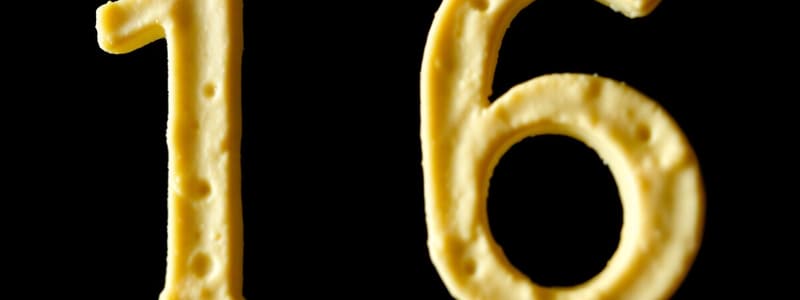Podcast
Questions and Answers
Which set of numbers includes both positive and negative integers?
Which set of numbers includes both positive and negative integers?
- Integers (correct)
- Whole Numbers
- Rational Numbers
- Natural Numbers
What type of number is defined as an integer that can be expressed as a fraction?
What type of number is defined as an integer that can be expressed as a fraction?
- Natural Numbers
- Rational Numbers (correct)
- Whole Numbers
- Real Numbers
What is the main distinguishing feature of even numbers?
What is the main distinguishing feature of even numbers?
- They are always whole numbers.
- They are always fractions.
- They can be divided into two equal parts. (correct)
- They are greater than zero.
Which of the following is NOT considered a whole number?
Which of the following is NOT considered a whole number?
Which number set includes both rational and irrational numbers?
Which number set includes both rational and irrational numbers?
What characterizes a natural number?
What characterizes a natural number?
Which of the following statements about zero is TRUE?
Which of the following statements about zero is TRUE?
What is a defining property of odd numbers?
What is a defining property of odd numbers?
Which of the following is a correct definition of a prime number?
Which of the following is a correct definition of a prime number?
Which of the following is an example of a composite number?
Which of the following is an example of a composite number?
What is the result of the cube root of 64?
What is the result of the cube root of 64?
Which of the following lists correctly identifies the first three multiples of 12?
Which of the following lists correctly identifies the first three multiples of 12?
Which statement is true regarding square numbers?
Which statement is true regarding square numbers?
Which of the following is the only even prime number?
Which of the following is the only even prime number?
What is the correct definition of a multiple of a number?
What is the correct definition of a multiple of a number?
Which of these numbers are square numbers?
Which of these numbers are square numbers?
Study Notes
Natural Numbers
- Natural numbers are positive whole numbers, starting with 1 and increasing infinitely
- Example: 1, 2, 3, 4, 5, ...
Whole Numbers
- Whole numbers include all natural numbers plus zero
- Example: 0, 1, 2, 3, 4, 5, ...
Integers
- Integers include all whole numbers plus negative counterparts of natural numbers
- Example: ..., -3, -2, -1, 0, 1, 2, 3, ...
Rational Numbers
- Rational numbers can be represented as fractions where both numerator and denominator are integers
- Example: 1/2, 3/4, 7/2, -4/3, 4/1
- Note that the denominator cannot be 0, but the numerator can
Real Numbers
- Real numbers include all numbers that can be written in decimal form, including fractions in decimal form
- Example: 0.5, 0.75, 2.35, -0.073, 0.3333, 2.142857
Number Construction
- Numbers are typically represented using ten numerical symbols (0-9) and symbols like ".", "+" and "-"
- Zero (0) plays an important role as a placeholder, representing the absence of units in a specific place value
- Examples: 5, 27, 35.8, -4
Odd Numbers
- Odd numbers cannot be divided into two equal parts with no remainders
- Example: 3, 5, 7, 9, 11, 13, 15...
Even Numbers
- Even numbers can be divided into two equal parts with no remainders
- Example: 2, 4, 6, 8, 10, 12, 14 ...
Factors
- Factors of a number are whole numbers that divide evenly into the number with no remainders.
- Example: Factors of 8 are {1, 2, 4, and 8}
Multiples
- Multiples of a number can be found by multiplying the number by any whole number.
- Example: Multiples of 8 are 1×8= 8, 2×8= 16, 3×8= 24...
Prime Numbers
- Prime numbers have only two factors: 1 and themselves.
- Example: {2, 3, 5, 7, 11, 13, 17, 19, 23, 29, 31, 37... etc.}
Composite Numbers
- Composite numbers have more than two factors.
- Example: {4, 6, 8, 9, 10, 12, 14, 15, 16, 18... etc.}
Square Numbers
- Square numbers are obtained by multiplying a number by itself once.
- Example: 9×9= 81, therefore 81 is a square number.
Cube Numbers
- Cube numbers are obtained by multiplying a number by itself twice.
- Example: 4×4×4=64 therefore 64 is a cube number.
Square Roots
- The square root of a number is the value which, when multiplied by itself, equals the original number.
- Example: √64 = 8 because 8×8 = 64.
Cube Roots
- The cube root of a number is the value which, when multiplied by itself twice, equals the original number.
- Example: 3√125 = 5 because 5×5×5 = 125.
Problem-Solving Elements
- Question: What is the only even prime number?
- Answer:* 2
- Question: How many prime numbers end in 5? Give a reason.
- Answer:* Only one, which is 5 itself because all other numbers ending in 5 are divisible by 5.
- Question: Why are there no primes that are multiples of 10?
- Answer:* Multiples of 10 are divisible by both 2 and 5, meaning they have at least three factors.
- Question: True/False: The sum of two prime numbers is always a prime number.
- Answer:* False. Example: (2 + 3 = 5) is prime, but (3 + 5 = 8) is not.
Studying That Suits You
Use AI to generate personalized quizzes and flashcards to suit your learning preferences.
Related Documents
Description
This quiz covers the various types of numbers, including natural numbers, whole numbers, integers, rational numbers, and real numbers. It explores their definitions, examples, and the significance of number construction. Test your knowledge and understanding of fundamental mathematical concepts related to numbers.




